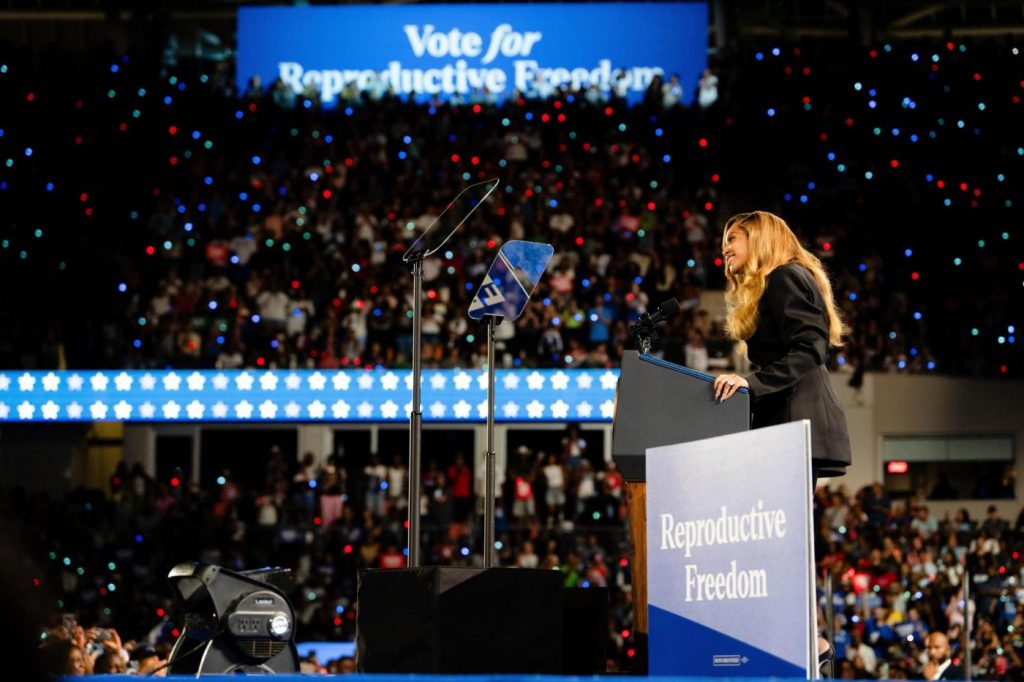LAS VEGAS — Late Friday night, in Traverse City, Michigan, former President Donald Trump stood before his supporters and informed them about what the competition was up to that very minute. “Kamala,” he said, “is at a dance party with Beyoncé.”
He said so in a sibilant, singsong way, stretching the syllables of the singer’s name — “Beyohnsayyy” — thus signaling his crowd to boo. They did.
All week long, famous people had been popping up on the campaign trail for Vice President Kamala Harris. There was Eminem in Michigan. James Taylor in North Carolina. Bruce Springsteen, Samuel L. Jackson, Tyler Perry and Spike Lee in Georgia. And, yes, Beyoncé, in Texas (Willie Nelson, too).
You had to wonder if some piece of Trump wasn’t at least a little jealous.
The celebrity equation is a complicated one for the former president. A former television star himself, he seems to crave the approval of famous people. But their contempt for him has its uses, too. Democrats use celebrity worship to motivate their base. Trump has celebrity hatred to motivate his.
To be famous is to be elite; to be a fervid Trump supporter is to hate and feel hated by elites everywhere.
The stampede of stars stumping for Harris in the final days of the presidential campaign just reinforced a grand narrative that Trump and his supporters tell themselves about the journey they are on together, in which they must take on all sorts of powerful forces arrayed against them. Movie stars and military generals, media personalities and musicians — it’s all one big cabal between Washington, New York and Hollywood. Beyoncé is the Deep State.
It’s a self-perpetuating cycle, a 10-year flame war between the entertainment world and Trump, whose most devoted supporters draw ever closer to him and further from everything else. Their relationship with popular culture becomes predicated on its stance toward this one man. Some become increasingly alienated and angry as the list of A-listers they’re not supposed to like gets longer. Some grow defensive. They seek out new celebrities to call their own.
These tortured dynamics have played out powerfully in response to the celebrity mania on the campaign trail.
On Thursday, while Springsteen was opening for Harris in Atlanta, thousands of Trump’s supporters waited for him to appear at a college sports stadium in Las Vegas. Michael McDonald, the chair of Nevada’s Republican Party, warmed up the audience. “Walking in here was fantastic,” he said, because he saw “so many celebrities — but they’re our celebrities.”
There was a performance by Common Kings, a reggae-rock band, and speeches by Vivek Ramaswamy and Tulsi Gabbard, who ran for president as a Democrat last time but recently became a Republican to support Trump.
Danica Patrick, the racecar driver, told the audience they ought to be proud to be Trump supporters, that they’re “an army of brilliant human beings” united in a fight against censorship. Gina Carano, the Trump-supporting actor who was dumped by The Walt Disney Co. after she compared the experience of Jews during the Holocaust to the current U.S. political climate, spoke of her anguish at being blackballed by Hollywood. She railed against the town.
“A lot of celebrities say, ‘I’m leaving the country if someone I don’t like is installed in power,’” she said. “I plan on staying here and fighting it out. That’s what patriots do. That’s what the people who truly love Americans do.” The crowd erupted when she told them that Elon Musk, the richest person in the world and a recent convert to Trumpism, was funding her lawsuit against the Mouse House.
Trump’s supporters love that they can now count Musk — a true celebrity — as one of their own. They cheer at every mention of his name. Other stars hitting the trail for the former president this season are not quite as high-wattage: Dennis Quaid, Brett Favre, Kid Rock and Hulk Hogan. (Mel Gibson endorsed Trump last week, too).
Jack Posobiec, a right-wing conspiracy theorist, told the crowd that if Trump were to win, they would all be able to go back in time to “an America where a family can take their kids out to the drive-in under the stars” without worrying “that the movie would teach them to hate their country.” This was perhaps overly optimistic — would wresting back control of the executive branch also somehow put them in charge of the movie studios? — but the point was taken nonetheless. These Americans are not buying what Hollywood is selling. They clapped along.
Some were feeling tetchy about all the celebrities working against them. “All these people that have all this money that are up there talking to us about who we need to vote for. They don’t go to the grocery store. They don’t get their cars filled at the gas station,” said Kim Kinsman, a 65-year-old retiree from Las Vegas who had worked for a bakery company.
(BEGIN OPTIONAL TRIM.)
She said she would never watch another Julia Roberts movie again. Beyoncé, she said, “doesn’t know anything about anything.” What about Taylor Swift? “Worthless,” Kinsman said. “I agree,” added Heather Pelton, a 42-year-old Las Vegas homemaker who was standing nearby.
(END OPTIONAL TRIM.)
Other Trump supporters reasoned that the Democrats’ use of entertainers was a sign of weakness. Many of the famous faces boosting Harris are the same ones who tried and failed to get Hillary Clinton over the line in 2016. Harris “needs them more than ever,” said Sheila Mehrens, a 74-year-old retiree from Henderson, Nevada. “She can’t get up and do something like Trump does,” Mehrens said, “so she’s got Bruce Springsteen.”
Springsteen’s performance for Harris in Georgia was evidently on Trump’s mind as well. As soon as he took the stage in Las Vegas, he said, “In Georgia tonight, they say that Kamala has just absolutely bombed.” But Trump also admitted that he was curious to see the stars come out for her, almost despite himself. “In fact, I was going to watch it, I didn’t want to come out, I wanted to watch that first,” he said.
“Isn’t that terrible?”
This article originally appeared in The New York Times.


